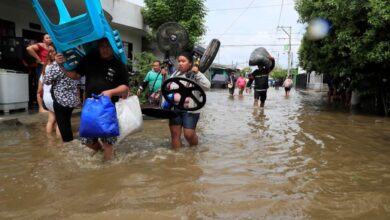Colombia: This is How Mining Companies Were Involved in the Armed Conflict
The Colombian Truth Commission Confirmed, in a Report, that the Mining Multinational AngloGold Ashanti Intervened in the Conflict. However, it is not the Only Company on Which There are Investigations.

Photo: Pixabay
LatinAmerican Post | María Fernanda Ramírez Ramos
Listen to this article
Leer en español: Colombia: así estuvieron involucradas las empresas mineras en el conflicto armado
Although the main actors in the Colombian armed conflict were the guerrillas, the paramilitary groups and the State, other groups were also involved, even if it was not through the exercise of direct violence. In this sense, the Peace Agreement included, within the special jurisdiction for peace, the clarification that the agreement would apply to "all those who have participated directly or indirectly in the armed conflict and have committed crimes in the context and in reason for this." In other words, those who were funders or collaborators would be taken into account.
Clarifying the role played by other social actors is essential to recognize the impacts of the armed conflict on the victims. Although it is true that the armed groups disputed territories to appropriate natural resources and use them for drug trafficking, there is also evidence that large companies were involved in these processes.
The Truth Commission demonstrates that AngloGold Ashanti intervened in the armed conflict
The Truth Commission, in its work to help clarify what happened during the armed conflict and collect information that would make it possible to understand the complexity of this phenomenon, collected thousands of testimonies and conducted research on the relationships that were woven around the violence. A final report, divided into several volumes, collects these findings. In addition, it presented a series of complementary documents and tools. One of them, entitled "Report on Case 78 in Alto Andágueda and Cocomopoca", reviews the relationship between the mining titles in this area and the armed conflict.
The report reviews the history of violence in this area of Chocó, which has been motivated by the struggle for mining concessions and ownership of the territory. Afro-descendants and indigenous people from the Alto Andágueda Resguardo live in this area, who were involved in struggles to claim the restitution of their territorial rights.
"The evidence is overwhelming. The direct link between military units and companies with mining concessions in the territory of the Alto Andágueda reserve involved a serious violation of human rights and an infraction of IHL (the prohibition of forced displacement)," the report states. In this regard, he says that between 2007 and 2015, the National Army bombed the reservation about eleven times in military actions against the ELN and the FARC.
The investigation also shows how, under the government of Álvaro Uribe, multiple mining titles were delivered to the South African multinational Anglo Gold Ashanti. At the same time, the granting of land rights to the communities was delayed to favor the mining companies that wanted to seize the resources.
Finally, this report states that "While the shared responsibility of the Ministry of Defense and the FARC-EP in the forced displacement of interests over mining resources is clarified, this case provides a final reflection on the factors of persistence of the armed conflict in Colombia".
A repeating phenomenon
The Colombian armed conflict is directly related to the colonial structures that remain over the territory and economic power. For this reason, one of the most important components in the implementation of the Peace Agreement is comprehensive rural reform, which addresses the problem of inequality in land ownership and the gaps between the urban and rural worlds.
Many of the regions hardest hit by violence are located in areas with natural oil and mining resources. The activity of the companies that exploit these resources, usually multinationals or with foreign capital, usually negatively affects the communities. Through the appropriation of the territory, with a consequent contamination and destruction of the ecosystems, they make the population sick, destroy their community and exercise violence.
For this reason, environmental and social conflicts arise that make communities resist and oppose extractivist projects. According to the Atlas of Environmental Justice, in Colombia there are more than 50 environmental conflicts caused by mining and material extraction. However, it is estimated that there are more conflicts, even if they are not registered on this platform.
In this context, the paramilitary and drug trafficking groups became the armed arms of multiple extractivist companies, which entered the territories apparently "legally", but with a background of violence, murders and human rights violations to seize the resources. In this regard, for example, the Commission notes that on the northeastern border of the country, the reasons for the consolidation of paramilitarism were related to territorial disputes, the defense of the status quo to maintain privileges, land grabbing, and the appropriation of monetary resources. or extractive economies.
We recommend you read: From "Backyard" to "Dumpster": This is How the US is Using Latin America as its Dumping Ground
On the other hand, the Corporate Accountability Lab (CAL), which investigates the relationship between transnational companies and the violation of human rights, presented in March of this year the first part of a report to the Special Jurisdiction for Peace (JEP ) on the role of multinational companies in the armed conflict. Said investigation, presented before the Chamber for the Recognition of Truth, Responsibility and Determination of Facts and Conduct, focused on the involvement of the mining companies Drummond Company (American) and Grupo Prodeco (of the Anglo-Swiss company Glencore International) in the conflict in the region of Magdalena Medio and Cesar. It has also studied the involvement of other companies such as Chiquita.
"We provide evidence that suggests that Drummond Company Inc., Drummond Ltd. and the Prodeco Group financially supported and aligned themselves with illegal armed groups such as the Juan Andrés Álvarez Front of the United Self-Defense Forces of Colombia (AUC)," the CAL said in a statement. This organization also has a project on Corporate Responsibility in Transitional Justice.





